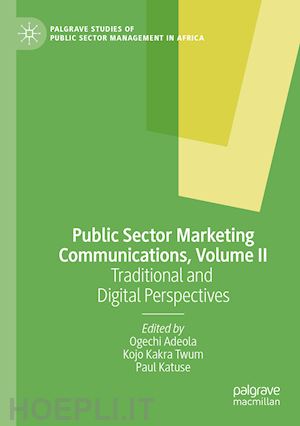
Questo prodotto usufruisce delle SPEDIZIONI GRATIS
selezionando l'opzione Corriere Veloce in fase di ordine.
Pagabile anche con Carta della cultura giovani e del merito, 18App Bonus Cultura e Carta del Docente
Building public sector image and trust in Africa requires judicious use of appropriate marketing communications tools and platforms. Contributing authors to this second volume of a two-volume work offer insights into how the selection and strategic utilisation of marketing tools will facilitate interactions between the government and the citizens, improve inter-governmental and inter-agency collaboration, and boost a citizen-oriented public sector. Traditional marketing communications tools continue to play a key role in citizen and public sector relationships; however, given mega-trends of demographic change, urbanisation, and digitalisation in Africa, it is important to consider how public institutions, including government agencies, local government, universities, and football associations, respond and adapt to these changes. The digital revolution presents an opportunity for public sector institutions to align their communication plans with new technologies, particularly leveraging social media platforms.
Together with the first volume, which focuses on public relations and brand communication perspectives, this collection fills an existing information gap evident in Africa’s public sector literature. The text serves as a decision making, teaching, and learning guide for practitioners, faculty, and students interested in applying marketing principles and practices to the public sector.
Part 1: Traditional and Digital Perspectives on Public Sector Marketing Communications.- Chapter 1: Traditional and Digital Perspectives on Public Sector Marketing Communications.- Part 2: Advertising and Direct Marketing.- Chapter 2: Public Service Advertising and Celebrity endorsement in Ghana.- Chapter 3: Direct Marketing in the Kenyan Public Sector.- Part 3: Digital and Social Media Marketing. - Chapter 4: Using Social Media by Ghanaian district Assemblies.- Chapter 5: Digital technology and emergency risk communication of African governments: experiences and lessons from Covid-19.- Chapter 6: Optimising social media and marketing communication strategies for voter education: A way forward for Independent National Electoral Commission (INEC) in Nigeria.- Chapter 7: Social Media Adoption in Public Sector Communication: Current practices, opportunities and challenges in Public Sector Organisations.- Part 4: Conclusions.- Chapter 8: Providing a Roadmap for Effective Public Sector Marketing Communications in Africa.
Kojo Kakra Twum is a Lecturer at Presbyterian University College, Department of Business Administration and Economics, and a doctoral student at the University of Cape Coast, Department of Marketing and Supply Chain Management. As a marketing academic, he has been involved in training public sector organisations in adopting marketing strategies to enhance their effectiveness. He has publications in the areas of service marketing, political marketing, and public organisation marketing. He is co-Editor of Responsible Management (2021, Palgrave Macmillan).
Paul Katuse is an Associate Professor of business administration in the SUC School of Business in Sharjah UAE. Paul is a strategy and leadership expert trainer. He is an experienced academic who has worked in several countries in Asia, Africa and the middle east. He has consulted with the public sector and the private sector in Kenya and his main interests are in global issues and their impacts on organizations in developing economies, organizational responses to change and reforms, globalization and the management of change in organizations. He has of late taken a keen interest in the way organisations and society interact and especially the linkages between an organization's strategic issues, their core businesses and the society's welfare. He believes in the concept of Corestra that is consulting, researching and training so as to bring an impact into the concerned party.











Il sito utilizza cookie ed altri strumenti di tracciamento che raccolgono informazioni dal dispositivo dell’utente. Oltre ai cookie tecnici ed analitici aggregati, strettamente necessari per il funzionamento di questo sito web, previo consenso dell’utente possono essere installati cookie di profilazione e marketing e cookie dei social media. Cliccando su “Accetto tutti i cookie” saranno attivate tutte le categorie di cookie. Per accettare solo deterninate categorie di cookie, cliccare invece su “Impostazioni cookie”. Chiudendo il banner o continuando a navigare saranno installati solo cookie tecnici. Per maggiori dettagli, consultare la Cookie Policy.